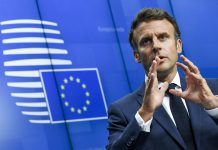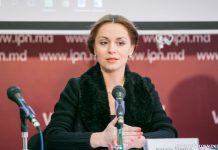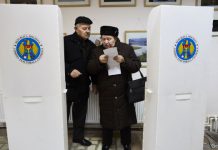BRUSSELS — Moldova’s quiet reinvention of itself after reformist parties ousted the country’s communist government in July 2009 became official today as Prime Minister Vlad Filat won full backing in Brussels for his reform program.
Although Moldova is nominally Europe’s least developed country, its reformist government has been able to persuade Western supporters in a remarkably short period of time that it is capable of turning its fortunes around.
The European Union’s enlargement and neighborhood commissioner, Stefan Fule, today described Filat’s administration as a "reliable partner" with a coherent strategy of reforms and clear targets.
"We are fully aware of the difficulty of the task you are confronted with," Fule said. "This is why the European Union, together with a number of other partners, is putting in place a real and substantial assistance package."
Filat now has $2.6 billion — half of it in the form of nonreturnable grants — from international donors as a reward for his efforts.
The EU’s contribution for 2011-2013 alone went up by some 75 percent and stands now at $364 million, with further funds in the pipeline. Moldova receives the second-largest share of EU aid per capita after the Palestinian territories.
Speaking for the World Bank, Moldova Country Director Martin Raiser repeatedly praised the early track record of Filat’s fledgling administration. He also underscored the vision and maturity of Filat’s reform strategy — which is called "Rethinking Moldova" — with its focus on public governance reforms, restoration of investor confidence, and investments in human capital.
A financing agreement Chisinau managed to strike with the International Monetary Fund in October 2009 has been crucial in convincing other Western organizations that Moldova’s reformist leaders mean business.
Filat said he was completely satisfied with the results of the day-long meeting, adding he hopes the pledges "opens up prospects for further financial and moral support."
‘Genuine Goodwill’
There is a sense of genuine goodwill within the EU for Moldova’s new government. EU officials privately describe it as young and enthusiastic and profess to being impressed by the ministers’ preparation for key meetings, as well as their willingness to learn.
The European Commission’s deputy director-general for external relations, Hugues Mingarelli, told representatives of Moldova’s government that EU officials have noted a massive change in attitude in Chisinau.
"Your government has been very clear that European integration will remain — will be — your strategic priority," Mingarelli said. "I can say, to be fair to your predecessors, ‘will remain,’ because we have always heard that European integration would be the strategic priority of Moldova in the last few years. But we are sure that with your government we will not only have words but deeds in this regard."
The results of today’s conference will have given a boost to the country’s ambition to negotiate a free-trade accord with the EU and establish visa-free travel with the bloc. Fule today said talks on both issues will start shortly.
A second round of EU-Moldova Association Agreement negotiations will take in Brussels on March 25.
EU officials today described Moldova as a "front-runner" in the bloc’s neighborhood policy program — a worthy accolade considering the country has to compete with Ukraine and Georgia, whose reforms were launched half a decade ago.
For now, the EU’s framework for engaging Moldova remains the Eastern Partnership. But the EU enlargement commissioner put further icing on Moldova’s cake by acknowledging publicly that the country’s "full integration" into the EU could one day become reality.







